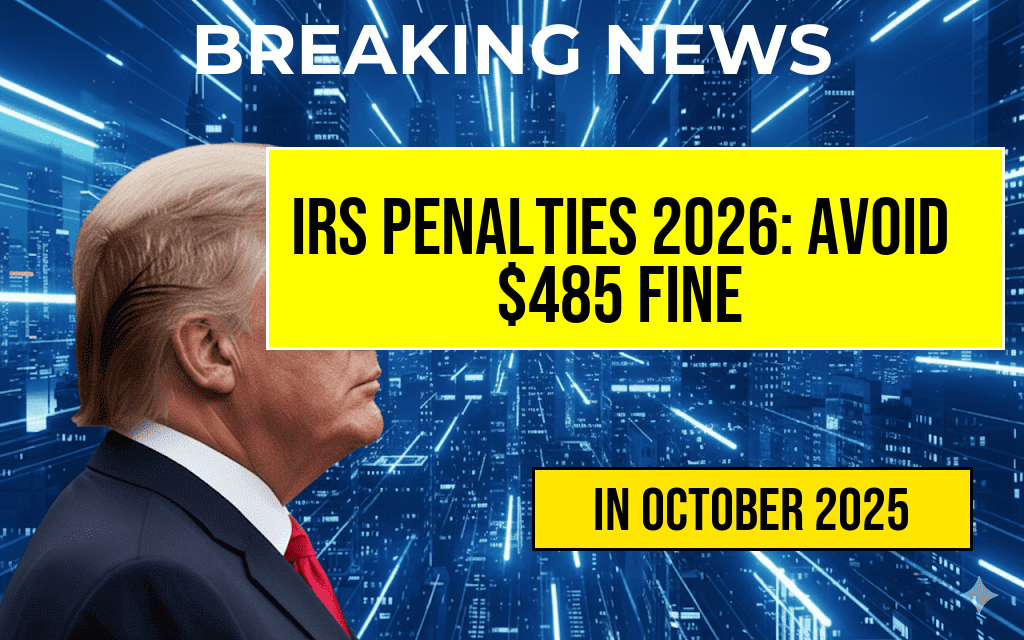The Internal Revenue Service (IRS) has announced upcoming changes to late-file penalties set to take effect in 2026, with the penalty amount rising from the current $435 to a maximum of $485 per tax return. This increase aims to encourage taxpayers to meet filing deadlines more consistently, but it also raises the stakes for those who miss the deadline without filing for an extension. The IRS emphasizes that timely filing remains the best way to avoid penalties, which can accumulate quickly for unpaid taxes or late submissions. Taxpayers should be aware of these adjustments to plan accordingly, especially as the IRS continues to modernize its enforcement strategies and collection efforts.
Understanding the 2026 Penalty Adjustment
Each year, the IRS reviews and adjusts penalties for late tax filings based on inflation and other economic factors. Starting in 2026, the maximum penalty for late-filed returns will increase from $435 to $485. The penalty is assessed for each month a return remains unfiled after the deadline, up to a maximum of 5 months, which can result in a significant financial impact for delinquent filers.
| Year | Maximum Penalty per Return | Monthly Penalty Rate | Maximum Duration |
|---|---|---|---|
| 2025 | $435 | 5% of unpaid tax or $435 (whichever is less) | 5 months |
| 2026 | $485 | 5% of unpaid tax or $485 (whichever is less) | 5 months |
Implications for Taxpayers
The increased penalty amounts underscore the importance of timely filing. The IRS notes that the penalty is calculated based on the amount of unpaid tax, with a fixed maximum penalty cap per return. For example, if a taxpayer owes $10,000 in taxes and files late, the monthly penalty could be up to 5% of the unpaid amount, or $500, for each month the return is late, capped at five months. This could lead to penalties exceeding $2,400 in some cases, not including interest or additional penalties for unpaid taxes.
Strategies to Avoid Penalties
- File on time or request an extension: Filing for an extension grants additional time to complete your return, typically until October 15, but it does not extend the time to pay any owed taxes.
- Pay estimated taxes: Making estimated payments can reduce the risk of underpayment penalties and interest on unpaid taxes.
- Set up payment plans: If unable to pay in full, taxpayers should consider installment agreements to manage their liabilities and avoid larger penalties.
Enforcement and Penalty Collection
The IRS has increased its enforcement efforts in recent years, utilizing data analytics and automation to identify delinquent filers. The agency also emphasizes that penalties can compound if unpaid taxes are not addressed promptly, leading to liens or levies. Taxpayers are encouraged to communicate with the IRS proactively if they face difficulties in meeting deadlines or settling their tax debts.
Additional Penalties and Interest
Beyond late-file penalties, taxpayers may face penalties for late payments and accruing interest on unpaid balances. These charges can significantly increase the total amount owed and complicate resolution efforts. The IRS provides resources and assistance programs to help taxpayers navigate these challenges, including penalty relief options for specific circumstances.
Resources and Next Steps
Taxpayers seeking more information about upcoming penalty changes can visit the official IRS website or consult with a qualified tax professional. Staying informed about policy adjustments and maintaining organized records can help mitigate risks associated with late filings and payments. As tax deadlines approach, proactive planning remains the most effective approach to avoiding increased penalties in 2026 and beyond.
Frequently Asked Questions
What is the upcoming IRS late-file penalty increase in 2026?
Starting in 2026, the IRS will increase the late-file penalty for missing the tax deadline, raising it from $485 to potentially higher amounts, making it crucial for taxpayers to file on time.
How can I avoid the $485 late-file fine in 2026?
To avoid the $485 late-file fine, ensure you file your tax return before the deadline, consider filing for an extension, and pay any owed taxes promptly to minimize penalties.
Are there exceptions to the late-file penalty increase?
Yes, the IRS may grant penalty relief in cases of reasonable cause, such as serious illness or natural disasters, which can help you avoid the increased fines despite late filing.
What are the consequences of not paying taxes on time in 2026?
Beyond the late-file penalty, failing to pay taxes can result in interest charges, additional penalties, and potential legal actions if taxes remain unpaid over time.
When does the late-file penalty increase take effect?
The penalty increase is scheduled to take effect in 2026, emphasizing the importance of timely filing to avoid higher fines and penalties.






